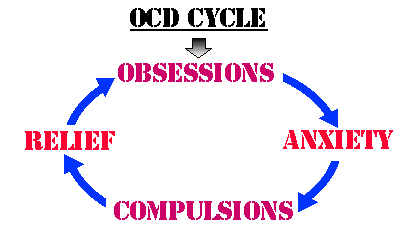Many of us
have small habits that make us feel better, but we can also live without them.
For example, we might think of something as ‘lucky’ or have a routine that
feels comforting. But for people who experience obsessive-compulsive disorder
(OCD), these behaviors are much more intense and disruptive and are fuelled by
unwanted thoughts that don’t go away. Obsessions are ideas, thoughts, impulses,
or images that keep coming back. They are not enjoyable; rather obsessions are
unwanted and upsetting, causing severe anxiety or distress. OCD sufferers
attach much greater meaning and threat to these thoughts than others. The
obsessions won't just "go away." In order to cope with the
obsessions, people with OCD engage in repeated behaviors or thoughts, known as
compulsions, to make themselves feel safer. Compulsions are rituals that the person
believes reduce the risk of the obsessions coming true, or at least reduce the
anxiety they produce. Obsessive-compulsive disorder is not always easy to
understand, but it’s a real illness that causes difficulties in a person’s
life. If you have OCD, you probably recognize that your obsessive thoughts and
compulsive behaviors are irrational but even so, you feel unable to resist them
and break free. Like a needle getting stuck on an old record,
obsessive-compulsive disorder causes the brain to get stuck on a particular
thought or urge. For example, you may check the stove twenty times to make sure
it’s really turned off, wash your hands until they’re scrubbed raw, or drive
around for hours to make sure that the bump you heard while driving wasn’t a
person you ran over. We all have a part of this disorder in my opinion; we all
get unwanted thoughts from time to time and sometimes is happens more than
once, people with OCD frequently perform tasks, or compulsions, to seek relief
from obsession-related anxiety.
Common OCd Types
(Percent of OCD Cases by Symptom)
(Percent of OCD Cases by Symptom)
Checking 79.3%
Hoarding 62.3%
Ordering 57.0%
Hoarding 62.3%
Ordering 57.0%
Morality 43.0%
Sexual/Religious 30.2%
Contamination/Washing 25.7%
Harming/Aggression 24.2%
Contamination/Washing 25.7%
Harming/Aggression 24.2%
Illness 14.3%
Other 19.0%
Other 19.0%

Mia, I absolutely love reading your blogs they`re very informative and interesting. A lot of people have little obssessions that they do a lot and they think that they have OCD when really it`s much more than that. These people feel like the world is over unless they do it and tpeople really need to undertsnad how this mental illness can ruin someones life.
ReplyDeleteYes i do agree, this subject for my blog is very interesting and I enjoy learning about new things each week. Mostly everyone has something they obsess over and there are certain people that have to do a daily routine to feel comfortable with life. I look forward to you guys keeping up with my blog. Thank you.
ReplyDeleteWow, good job Mia, it was very interesting I like to learn about things like this I find it super interesting. You did a great job explainnig it was really easy to understand and I cant wait to read your next post.Keep up the good work
ReplyDeleteYes Brooke, i do agree they are very interesting, i always learn something new with all of them and i get so intrigued very easily. thank you for taking the time to read my blog and commenting aswell, i hope that you continue to follow up with them
ReplyDeleteMany of your phrases can be found word-for-word on http://www.ocdtypes.com/.
ReplyDeleteCareful. Very hard to tell what are your own words and what is copy pasted form elsewhere.
Remember, regardless of sourcing at the bottom of your page, this is still plagiarism. You MUST rephrase or put such phrases in quotation marks with proper sourcing.